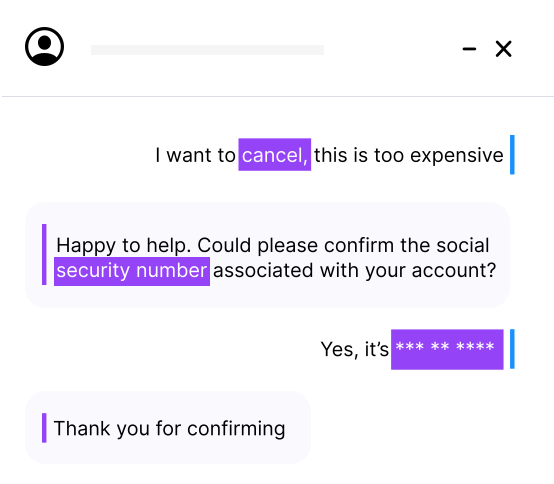Call center compliance is the strict adherence to the rules set by a regulatory body or an organization itself. Laws for contact center compliance can vary by country and failure to follow them can lead to repercussions. Maintaining compliance helps call centers:

Data security and customer privacy compliance focus on protecting sensitive customer information and ensuring the secure handling of data. Ethical and operational compliance policies focus on agent behavior, tracking, and ensuring ethical customer experience.
Payment Card Industry Data Security Standard (PCI DSS) prohibits contact centers from recording sensitive payment details like CVV numbers, full magnetic stripe data, or PINs. Contact centers usually use redaction software that automatically identifies and deletes any sensitive information during the interaction.
The General Data Protection Regulation (GDPR) requires companies to handle personal data responsibly, ensuring that customers have control over their information. Failure to comply can result in hefty fines and legal consequences for businesses operating in or serving customers in the European Union (EU).
Recording calls is an important practice for organizations to improve their services and assist in call center compliance training. However, most states in the U.S. mandate that both parties be aware of call recording. Agents should ask for consent before recording.
One of the many regulatory compliance standards comes from the Health Insurance Portability and Accountability Act (HIPAA), which protects the security and privacy of patient health information.
Compliance goes beyond customer interactions into assigning unique agent IDs to monitor compliance. Each agent should have a unique identifier when handling calls.
This allows center managers to trace interactions back to the right employee if any misconduct or data breach occurs. Proper monitoring helps enforce compliance and discourages unauthorized actions.
There are rules preventing businesses from calling consumers on the National Do Not Call Registry. Call centers must regularly check and maintain compliance with these lists to avoid legal penalties.
A federal regulation enforced by the Federal Trade Commission (FTC) that sets restrictions on deceptive or abusive telemarketing practices. Key conditions include:
Agents in a contact center must be trained annually on compliance to ensure the requirements aren’t neglected over time. This is also a great practice for updating agents on the frequently changing compliance standards.
Call centers engaged in collections must comply with laws like the Fair Debt Collection Practices Act (FDCPA), which prohibits harassment, threats, or misrepresentation to collect debts. Agents must be trained on appropriate language and best practices to handle debt-related calls legally and professionally.
The Telephone Consumer Protection Act (TCPA) is a U.S. federal law designed to protect consumers from unwanted telemarketing calls, robocalls, and spam messages. Put in place by the Federal Communications Commission (FCC), the TCPA sets strict guidelines on how businesses, including call centers, can communicate with consumers over the phone. Non-compliance can result in significant fines and legal action, making it essential for organizations to follow proper procedures.
Failing to comply with call center regulations can lead to serious legal, financial, and reputational consequences, including:
AI is making call center compliance easier by automating key processes, reducing errors, and ensuring agents follow important regulations like TCPA, GDPR, HIPAA, and PCI-DSS. Here’s how AI can help:
Advancements in contact center technology have automated a significant number of compliance tasks. For instance, call center compliance automation software can simply pause recording or auto-redact information in transcriptions when customers are providing credit card information.
Keeping up with changing regulations can be challenging, but Observe.AI makes it easy. With AI-powered monitoring, Observe.AI analyzes 100% of calls in real-time, automatically flagging compliance risks like missing disclosures, unauthorized data sharing, and script deviations.
Don’t let compliance risks put your business at stake. See how Observe.AI can help your call center stay compliant, protect customer trust, and avoid costly penalties.